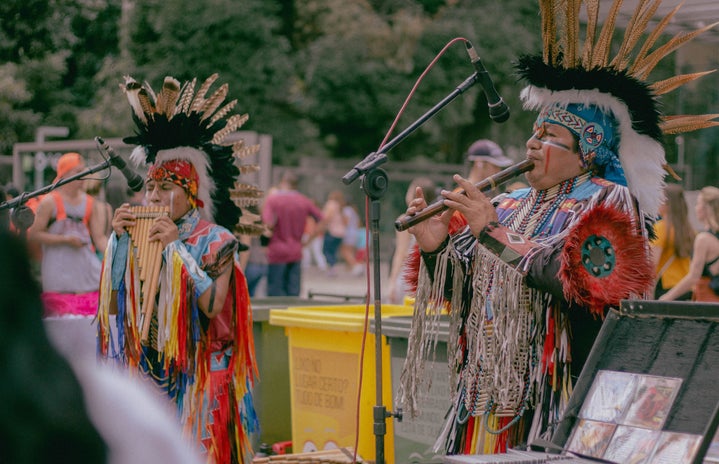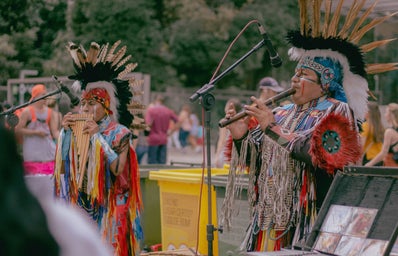It seems a simple thing to say that outfits that represent real cultural heritage and history for marginalized groups should only be worn by those that share in that heritage and history. However, time and again this notion is disregarded for the sake of a fancy dress costume. Some famous examples of this are Justin Trudeau’s brownface at an Arabian Night’s Party in 2001, and Scott Disick dressing as an Arab Sheik for Halloween in 2014. It is undoubtable that such examples constitute cultural appropriation, defined by Lisa A. Crayton as: ‘A form of identity theft. It happens when someone adopts another culture’s identifiable, tangible elements without honoring their cultural importance or significance.” Cultural appropriation allows people to wear a culture that isn’t theirs, without having to experience any of the lived discrimination of its people. This practice is particularly prominent around the Halloween period, with Native American cultures amongst those most affected.
TikTok creator Mele (@melemaikalanimakalapua) uses her platform to educate her followers on aspects of native Hawaiian culture which are often misunderstood or misrepresented in the media. In a recent TikTok, Mele addresses the appropriation of her culture through Halloween costumes, stressing that: “A lot of the outfits sexualize the Hawaiian culture and spread inaccurate stereotypes. A group of native people should never be seen as a costume or a theme.” Mele touches on the fetishization of her culture – a practice that all too often negatively impacts marginalized communities. In another video, Mele stresses that Hawaiians actually never wore coconut bras and grass skirts often marketed as ‘Hula girl’ costumes. She states:
“Using Hawaiian culture and using it to sell a false image of Hawai’i and Hawaiians is ruining how people should actually be viewing us.”
Other native American communities are harmfully stereotyped in a similar vein. Searches for ‘native American costume’ show a multitude of outfits featuring fake suede, fringing, feathers, and imitations of Native American headdresses. Many of these outfits are categorized under ‘Western: Cowboys vs. Indians,’ which is particularly problematic due to the colonizing implications of the Cowboys vs. Indians trope. Henu Josephine Tarrant, a New York-based artist and performer of the Ho-Chunk, Hopi and Rappahannock tribes, stresses that such categorization historicizes a culture that is very much still alive:
“We aren’t seen as modern-day people at all. That’s also what makes it really difficult for people to understand that what they’re doing is offensive,” Tarrant said. “Because for so long, it’s really been, I guess, ingrained into Americana, and cowboys and Indians is a part of that.”
It is clear from these discussions that stereotyping and simplifying complex cultures into a marketable Halloween costume not only adds insult to the suffering experienced by marginalized communities, it is also an extension of the attitudes which painted Britain’s colonial past. In other words, cultural appropriation is another form of oppression that marginalized groups must endure at the hands of their historical colonizers. Such continued oppression contributes to a wider narrative endured by Native people across the Americas: a narrative that sees the highest percentage of poverty in any ethnic group, the lowest life expectancy, and a high rate of violence impacting native women in particular (source: https://minorityrights.org/minorities/native-americans/).
With the rise of social media, campaigns led by native activists against cultural appropriation in fancy dress costumes have made huge headway. In recent years, the hashtags #notyourcostume and #myculturenotyourcostume have trended online, raising awareness for the issue of cultural appropriation of Native Americans in particular. As such, conversations around cultural appropriation in fancy dress (specifical instances around Halloween) are not new. Yet, it still only takes seconds to find thousands of suppliers selling ‘native American,’ and ‘Hula girl’ costumes marketed for Halloween celebrations: with the most notable offenders being Amazon and Smiffy’s.
So how can we move forward?
There are multiple examples of Universities utilizing their resources in order to re-educate students on cultural appropriation, specifically around the Halloween period. Ohio University launched a campaign in 2011 called “We’re a Culture, Not a Costume.” Programs such as these also encourage students to research on their own in order to find out why they shouldn’t imitate native culture; this ensures that students can better understand the structures behind cultural appropriation, and foster a genuine concern for how appropriation can affect native communities.
Whilst it is impossible to control what people chose to wear in a public setting, private events can have a hand in preventing cultural appropriation. For example, some festivals such as the Outside Lands Festival in San Diego, have banned Native American dress for attendees not historically linked to the indigenous culture.
However, whilst re-education and private action is important in changing an individuals perspective, The Action Network points out in their campaign to end the sale of native costumes that what is sold to the masses determines what the masses will buy. By continuing to market and sell racist tropes, corporations actively encourage the idea that these costumes are in anyway justifiable and diminish their harmful impact on the people they depict. It’s about time that superstores and conglomerates such as Amazon and Smiffy’s are held accountable for selling racialy degraded costumes, and discontinued their production.
Nothing can undo the years of hurt experienced by indigenous communities throughout the Americas, but steps must be taken to ensure that further injury is not inflicted upon these incredible communities who contribute so much.
If you would like to see the end to sales of Native-themed costumes, please check out the work that Action Network is doing here.


